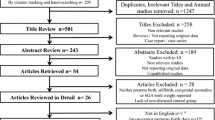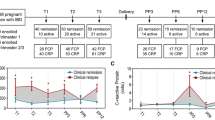Abstract
Background
The majority of studies that report early life risk factors for pediatric-onset inflammatory bowel disease (IBD) do not account for potential confounding, which can lead to spurious associations and incorrect inferences.
Aims
To assess the relationship between prenatal and perinatal characteristics and the risk of pediatric-onset IBD accounting for potential confounding.
Methods
We conducted a nested case–control study of 189 cases aged ≤18 years and 3,080 age- and membership-matched controls born at a Kaiser Permanente Northern California facility between 1984 and 2006. The cases were diagnosed with IBD between 1996 and 2006 and diagnosis was confirmed by chart review. We obtained prenatal and perinatal characteristics from the electronic clinical records of the mother and child. Conditional logistic regression was used to assess the associations between these factors and risk of incident IBD, Crohn’s disease, and ulcerative colitis.
Results
In analyses accounting for confounding, maternal IBD (odds ratio [OR] 5.1, 95 % confidence interval [CI] 2.0–12.9) and white race (OR 2.3, 95 % CI 1.6–3.2) were the only factors statistically associated with pediatric-onset IBD. Maternal respiratory infection during pregnancy (OR 2.0, 95 % CI 1.0–4.0), age < 20 years (OR 2.0, 95 % CI 0.8–4.7) and gestational hypertension (OR 1.7, 95 % CI 1.0–2.7) were associated with pediatric-onset IBD, but did not achieve statistical significance.
Conclusions
Maternal history of IBD and race were the only characteristics of those that we examined that were associated with the development of pediatric IBD in this well-documented population of cases and matched controls.
Similar content being viewed by others
References
Heyman MB, Kirschner BS, Gold BD, et al. Children with early-onset inflammatory bowel disease (IBD): analysis of a pediatric IBD consortium registry. J Pediatr. 2005;146:35–40.
Abraham C, Cho JH. Inflammatory bowel disease. N Engl J Med. 2009;361:2066–2078.
West LJ. Defining critical windows in the development of the human immune system. Hum Exp Toxicol. 2002;21:499–505.
Ekbom A, Adami HO, Helmick CG, et al. Perinatal risk factors for inflammatory bowel disease: a case-control study. Am J Epidemiol. 1990;132:1111–1119.
Wurzelmann JI, Lyles CM, Sandler RS. Childhood infections and the risk of inflammatory bowel disease. Dig Dis Sci. 1994;39:555–560.
Gruber M, Marshall JR, Zielezny M, Lance P. A case-control study to examine the influence of maternal perinatal behaviors on the incidence of Crohn’s disease. Gastroenterol Nurs. 1996;19:53–59.
Montgomery SM, Morris DL, Pounder RE, Wakefield AJ. Paramyxovirus infections in childhood and subsequent inflammatory bowel disease. Gastroenterology. 1999;116:796–803.
Montgomery SM, Lambe M, Wakefield AJ, et al. Siblings and the risk of inflammatory bowel disease. Scand J Gastroenterol. 2002;37:1301–1308.
Baron S, Turck D, Leplat C, et al. Environmental risk factors in paediatric inflammatory bowel diseases: a population-based case control study. Gut. 2005;54:357–363.
Amre DK, Lambrette P, Law L, et al. Investigating the hygiene hypothesis as a risk factor in pediatric onset Crohn’s disease: a case-control study. Am J Gastroenterol. 2006;101:1005–1011.
Aspberg S, Dahlquist G, Kahan T, Kallen B. Fetal and perinatal risk factors for inflammatory bowel disease. Acta Paediatr. 2006;95:1001–1004.
Garcia Rodriguez LA, Ruigomez A, Panes J. Acute gastroenteritis is followed by an increased risk of inflammatory bowel disease. Gastroenterology 2006;130:1588–1594.
Halfvarson J, Jess T, Magnuson A, et al. Environmental factors in inflammatory bowel disease: a co-twin control study of a Swedish-Danish twin population. Inflamm Bowel Dis. 2006;12:925–933.
Radon K, Windstetter D, Poluda AL, et al. Contact with farm animals in early life and juvenile inflammatory bowel disease: a case-control study. Pediatrics. 2007;120:354–361.
Sonntag B, Stolze B, Heinecke A, et al. Preterm birth but not mode of delivery is associated with an increased risk of developing inflammatory bowel disease later in life. Inflamm Bowel Dis. 2007;13:1385–1390.
Hildebrand H, Malmborg P, Askling J, et al. Early-life exposures associated with antibiotic use and risk of subsequent Crohn’s disease. Scand J Gastroenterol. 2008;43:961–966.
Bengtson MB, Solberg IC, Aamodt G, et al. Relationships between inflammatory bowel disease and perinatal factors: both maternal and paternal disease are related to preterm birth of offspring. Inflamm Bowel Dis. 2010;16:847–855.
Han DY, Fraser AG, Dryland P, Ferguson LR. Environmental factors in the development of chronic inflammation: a case-control study on risk factors for Crohn’s disease within New Zealand. Mutat Res. 2010;690:116–122
Ponsonby AL, Catto-Smith AG, Pezic A, et al. Association between early-life factors and risk of child-onset Crohn’s disease among Victorian children born 1983–1998: a birth cohort study. Inflamm Bowel Dis. 2009;15:858–866.
Gearry RB, Richardson AK, Frampton CM, et al. Population-based cases control study of inflammatory bowel disease risk factors. J Gastroenterol Hepatol. 2010;25:325–333.
Lopez-Serrano P, Perez-Calle JL, Perez-Fernandez MT, et al. Environmental risk factors in inflammatory bowel diseases. Investigating the hygiene hypothesis: a Spanish case-control study. Scand J Gastroenterol. 2010;45:1464–1471.
Decker E, Engelmann G, Findeisen A, et al. Cesarean delivery is associated with celiac disease but not inflammatory bowel disease in children. Pediatrics. 2010;125:e1433–e1440.
Hviid A, Svanstrom H, Frisch M. Antibiotic use and inflammatory bowel diseases in childhood. Gut. 2011;60:49–54.
Gilat T, Hacohen D, Lilos P, Langman MJ. Childhood factors in ulcerative colitis and Crohn’s disease. An international cooperative study. Scand J Gastroenterol. 1987;22:1009–1024.
Roberts SE, Wotton CJ, Williams JG, et al. Perinatal and early life risk factors for inflammatory bowel disease. World J Gastroenterol. 2011;17:743–749.
Bager P, Simonsen J, Nielsen NM, Frisch M. Cesarean section and offspring’s risk of inflammatory bowel disease: a national cohort study. Inflamm Bowel Dis. (Epub ahead of print). doi:10.1002/ibd.21805.
Klement E, Cohen RV, Boxman J, et al. Breastfeeding and risk of inflammatory bowel disease: a systematic review with meta-analysis. Am J Clin Nutr. 2004;80:1342–1352.
Barclay AR, Russell RK, Wilson ML, et al. Systematic review: the role of breastfeeding in the development of pediatric inflammatory bowel disease. J Pediatr. 2009;155:421–426.
Gordon NP. How does the adult Kaiser Permanente membership in Northern California compare with the larger community? 2006.
Herrinton LJ, Liu L, Lafata JE, et al. Estimation of the period prevalence of inflammatory bowel disease among nine health plans using computerized diagnoses and outpatient pharmacy dispensings. Inflamm Bowel Dis. 2007;13:451–461.
Abramson O, Durant M, Mow W, et al. Incidence, prevalence, and time trends of pediatric inflammatory bowel disease in Northern California, 1996 to 2006. J Pediatr. 2010;157:233, 239.e1.
North American Society for Pediatric Gastroenterology, Hepatology, and Nutrition, Colitis Foundation of America, Bousvaros A, et al. Differentiating ulcerative colitis from Crohn disease in children and young adults: report of a working group of the North American Society for Pediatric Gastroenterology, Hepatology, and Nutrition and the Crohn’s and Colitis Foundation of America. J Pediatr Gastroenterol Nutr. 2007;44:653–674.
Breslow NE, Day NE. Statistical methods in cancer research. Volume I—the analysis of case-control studies. IARC Sci Publ. 1980;32:5–338.
Herrinton LJ, Liu L, Lewis JD, et al. Incidence and prevalence of inflammatory bowel disease in a Northern California managed care organization, 1996–2002. Am J Gastroenterol. 2008;103:1998–2006.
Gronlund MM, Lehtonen OP, Eerola E, Kero P. Fecal microflora in healthy infants born by different methods of delivery: permanent changes in intestinal flora after cesarean delivery. J Pediatr Gastroenterol Nutr. 1999;28:19–25.
Dominguez-Bello MG, Blaser MJ, Ley RE, Knight R. Development of the human gastrointestinal microbiota and insights from high-throughput sequencing. Gastroenterology. 2011;140:1713–1719.
Molodecky NA, Panaccione R, Ghosh S, et al. Challenges associated with identifying the environmental determinants of the inflammatory bowel diseases. Inflamm Bowel Dis. 2011;17:1792–1799.
Acknowledgments
This study was funded by grant R40 MC 11266, through the U.S. Department of Health and Human Services, Health Resources and Services Administration, Maternal and Child Health Research Program (Herrinton); American Gastroenterology Association Graduate Student Research Award, Charlotte Ferencz Scholarship in Epidemiology and the Meyerhoff, Rosenwald and Weinman Family Funds (Hutfless); and NIH–NIDDK K24 DK060617 (Heyman). The funding sources did not play a role in the study design, collection, analysis, or interpretation of the data, nor in the writing of the report.
Conflict of interest
The authors have no potential competing interests.
Author information
Authors and Affiliations
Corresponding author
Appendix
Appendix
See Table 4.
Rights and permissions
About this article
Cite this article
Hutfless, S., Li, DK., Heyman, M.B. et al. Prenatal and Perinatal Characteristics Associated with Pediatric-Onset Inflammatory Bowel Disease. Dig Dis Sci 57, 2149–2156 (2012). https://doi.org/10.1007/s10620-012-2128-1
Received:
Accepted:
Published:
Issue Date:
DOI: https://doi.org/10.1007/s10620-012-2128-1




